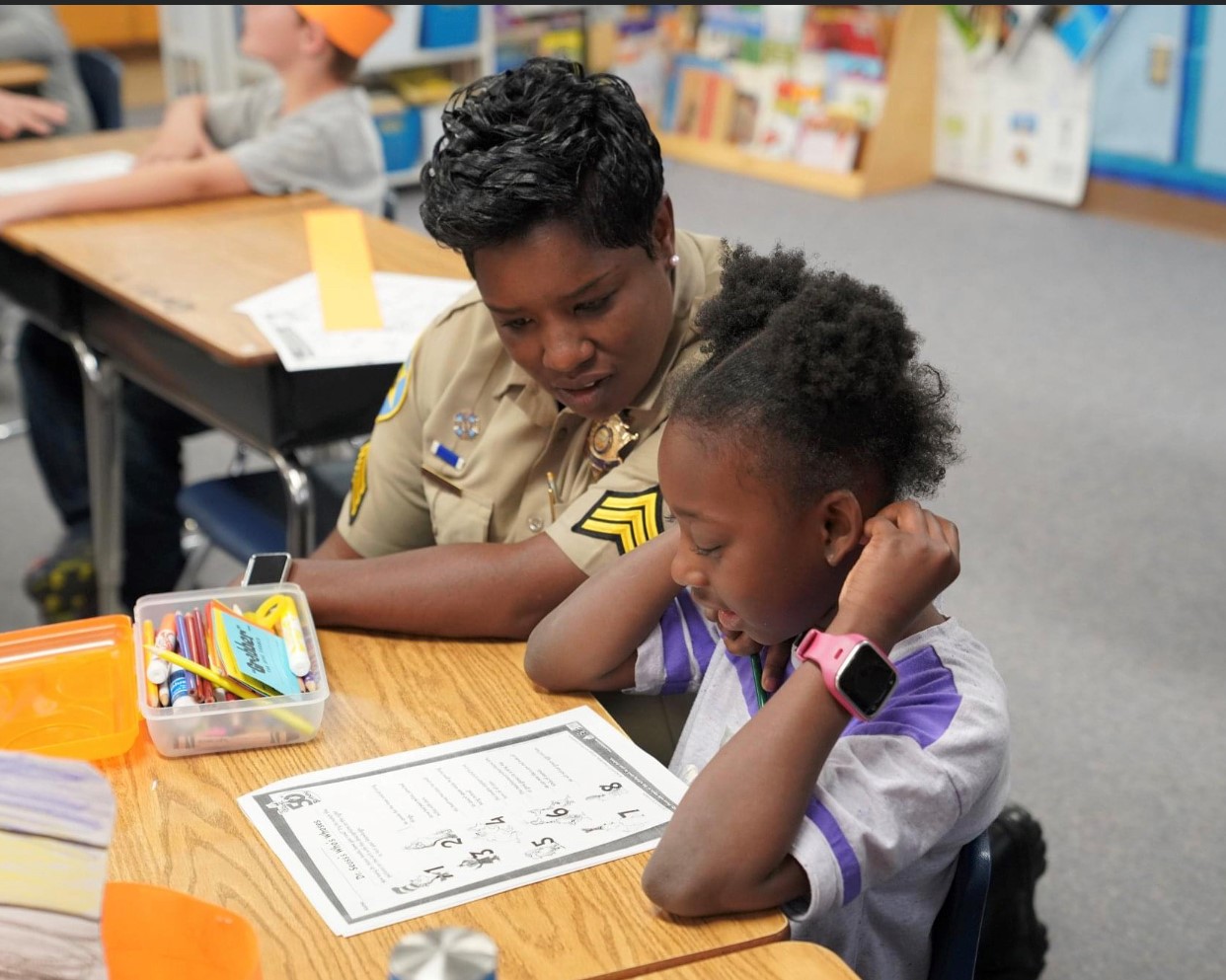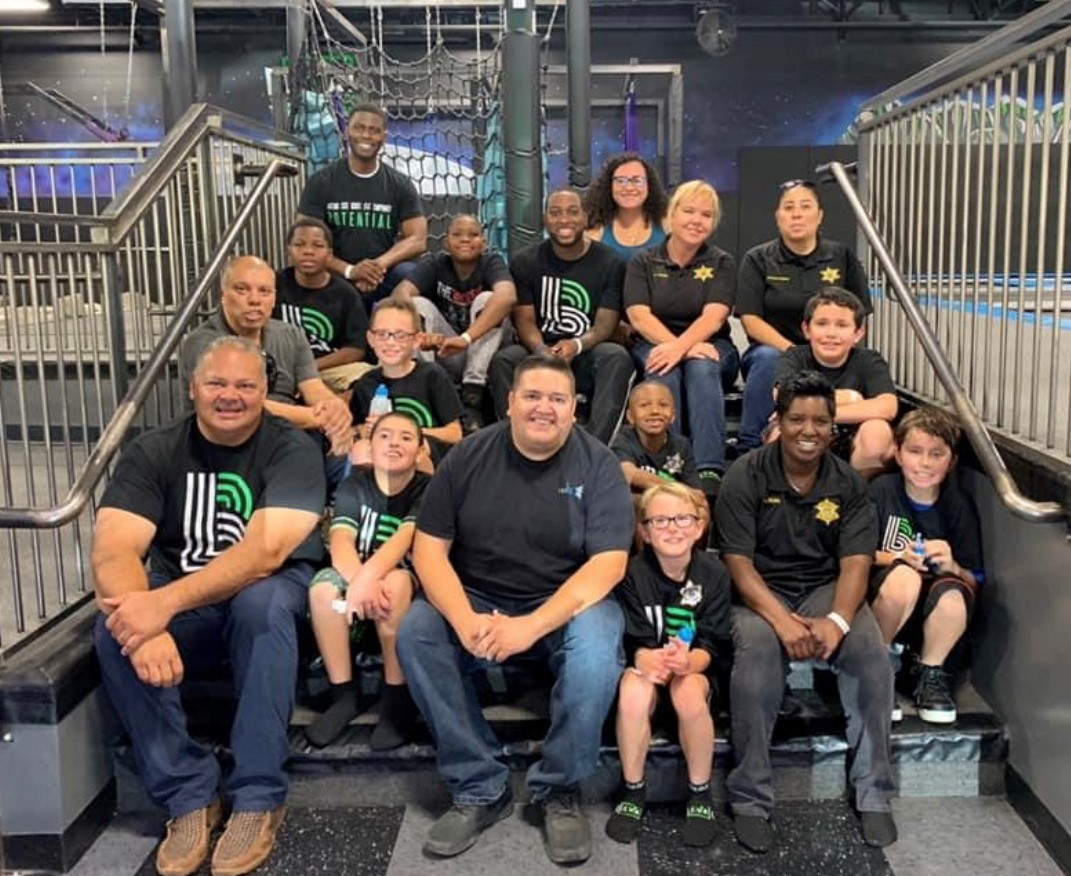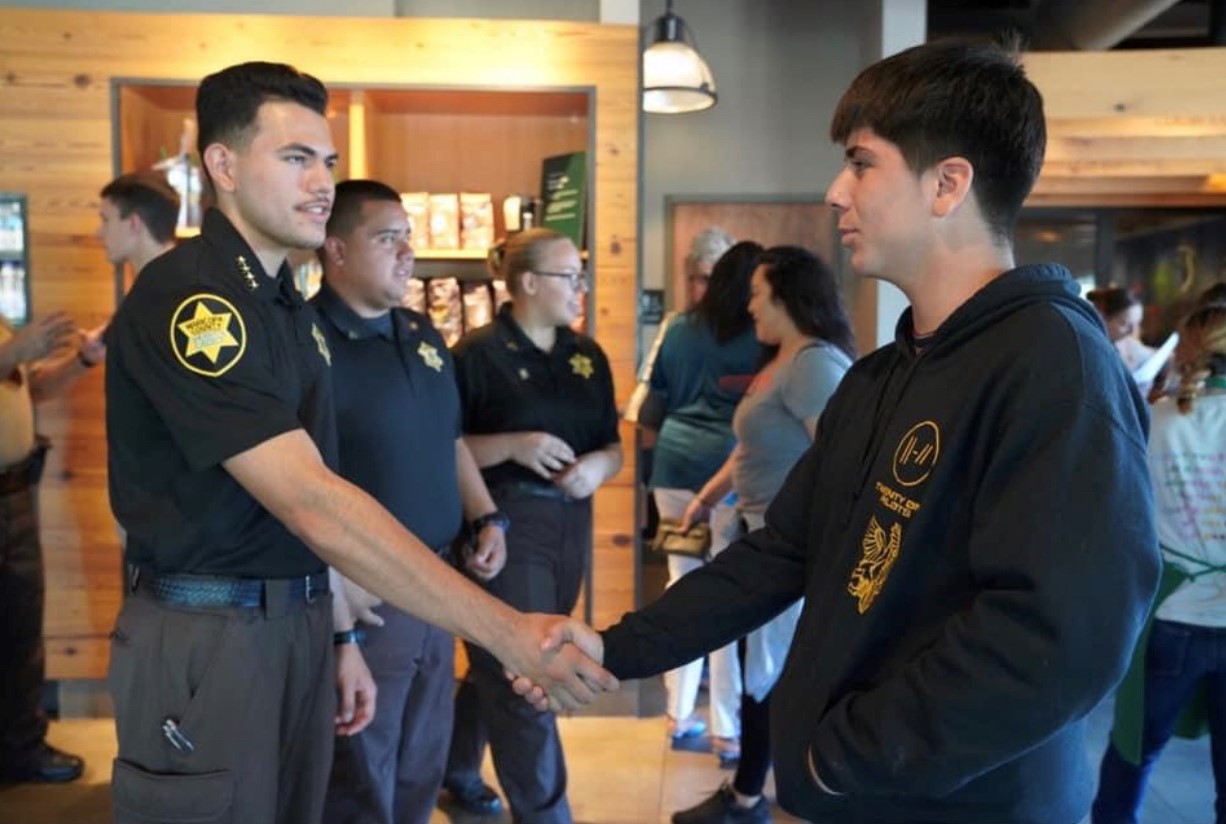Contact Us
To provide feedback on the Community Policing Dispatch, e-mail the editorial board at CPDispatch@usdoj.gov.
To obtain details on COPS Office programs, publications, and resources, contact the COPS Office Response Center at 800-421-6770 or AskCopsRC@usdoj.gov

U.S. Department of Justice
Office of Community Oriented Policing Services
Washington, DC 20530
 Among the duties Maricopa County Sheriff’s Office (MCSO) Sgt. Laketta Gunn-Roman most enjoyed last year was celebrating the 115th birthday of children’s book author Theodor Seuss Geisel, better known as Dr. Seuss, on March 2, 2019.
Among the duties Maricopa County Sheriff’s Office (MCSO) Sgt. Laketta Gunn-Roman most enjoyed last year was celebrating the 115th birthday of children’s book author Theodor Seuss Geisel, better known as Dr. Seuss, on March 2, 2019.
Along with other members of MCSO’s Community Outreach Division (COrD), Sgt. Gunn-Roman visited Taft Elementary School to commemorate the author’s birthday by reading Dr. Seuss stories to the children. But as soon as she entered the classroom, the child in the photo asked to sit with her.
According to Gunn-Roman, this was not an unusual occurrence. “A lot of minority girls gravitate to me when I’m in uniform, and I think it's because I’m also a minority and a woman, and they can see themselves in me.”
A Community Outreach Division Connects with Maricopa Residents
An eighteen-year veteran with MCSO, in which she previously assigned to the Detention Unit, Gunn-Roman is now a member of the COrD team, which was established by Sheriff Paul Penzone to promote partnerships and trust between the Sheriff’s Office and the people who live and work in Maricopa County.
 In 2016, when he was elected Sheriff of MCSO, an office serving more than four million residents in a county almost as large as the state of Vermont, Penzone decided that the best way to understand the concerns and meet the safety needs of this huge and varied area was to get his staff personally involved through outreach programs and events.
In 2016, when he was elected Sheriff of MCSO, an office serving more than four million residents in a county almost as large as the state of Vermont, Penzone decided that the best way to understand the concerns and meet the safety needs of this huge and varied area was to get his staff personally involved through outreach programs and events.
Today, COrD supports and participates in a wide variety of activities, such as Shop with the Sheriff, a Big Brother, Big Sister program in which MCSO employees mentor young people, Special Olympics, and community parades.
And, as part of its mission to create dialogue with all Maricopa County residents, COrD also supports three Advisory Boards, which serve the Hispanic, African American, and LGBTQ communities.
Three Advisory Boards Serve Diverse Communities
Designed to serve as liaison between the Sheriff's Office and these communities, the Boards enable Hispanic, African American, and LGBTQ residents to address public safety issues and quality of life concerns with the MCSO. Based on their findings, each Board provides actionable recommendations for enhancing procedural justice, respect for diversity, and mutual understanding.
As the result of a recommendation made by the LGBTQ Advisory Board in 2018, the Maricopa County Sheriff's Office established policy GJ-37 to ensure that members of the LGBTQ community receive respectful, unbiased service during traffic stops or while under MCSO custody for an arrest.
Gunn-Roman is active in several MCSO programs. One of them is the peer support program, in which trained employees, both sworn and non-sworn, help colleagues get access to needed resources as well as emotional, personal, and job-related support during times of crisis.
But the activities she likes best focus on building connections with and investing in young people. “This is very important, not just to me, but to our department and the community,” she says, emphasizing that building trust has to start early in life.
“At one event, I overheard a mother speaking about me, telling her young son, ‘If you’re not good, she will arrest you and take you to jail.’ I took her aside and said, ‘I’m here to have fun with him, not to create fear. He should be running toward us, not away from us, if something happens.’’
“She said she would speak to him, and a few minutes later, he ran up to me and asked if he could give me a hug.”
Youth Programs that Build Trust
Gunn-Roman also participates in a youth program that partners MCSO with the Arizona Department of Public Safety, the Phoenix Police Department (PPD), and a nonprofit community service organization named Friendly House. Called Pathways to Justice Careers, it provides teenagers with workforce development and education related to different areas of law enforcement and criminal justice.
Another collaborative MCSO program is The Art of Fighting in the Ring and Not in Our Community. In this program, the Sheriff’s Activities League partners with the Guadalupe Boxing Gym to mentor young boxers, helping them develop positive ways to cope with negative emotions, as well as sparring skills.
The MCSO also has a Cadet Program for young people interested in law enforcement careers. Whether they decide to enter the field or not, the participants can learn some police tactics and techniques while developing leadership, responsibility, and other character traits that lead to success in life and work.
Engaging Kids in Coffee with a Cadet
 Always on the lookout for ways to get kids interested in law enforcement, Gunn-Roman’s COrD group changed an upcoming “Coffee with a Cop” event to a “Starbucks with MCSO Cadets” get-together: “We invited young people from the community, and asked those in our cadet program to come too. It was a huge success. There were about 30 young people there, engaging with each other, talking about the cadet program and what law enforcement is all about. We brought the booking van around to let them take a tour of it, which they got a kick out of, and Starbucks gave every kid a $5 gift card.”
Always on the lookout for ways to get kids interested in law enforcement, Gunn-Roman’s COrD group changed an upcoming “Coffee with a Cop” event to a “Starbucks with MCSO Cadets” get-together: “We invited young people from the community, and asked those in our cadet program to come too. It was a huge success. There were about 30 young people there, engaging with each other, talking about the cadet program and what law enforcement is all about. We brought the booking van around to let them take a tour of it, which they got a kick out of, and Starbucks gave every kid a $5 gift card.”
After the pandemic hit, Gunn-Roman’s COrD team did a virtual block watch with the kids too. During the watch, she asked how the officers can gain their trust. In response, one of the teenagers said: ‘How can I trust you if I don’t know you?’
“This is why it’s so important that we get to know these young people,” she says, “and that they get to know us too, that there is a person behind the badge.”
“Another child asked me ‘Why do police look so mean and have their hands on their guns when they’re in our school?’ That drove home the recognition that we have to look relatable and friendly. But what’s most important in all of our interactions is that we treat everybody with kindness and respect. This is how trust starts,” she says.
Building trust through personal relationships is at the center of all COrD activities. “It is always a privilege when we are able to connect with, understand, and learn from the communities we serve. And the best way to do this is to be in the community itself,” said Sheriff Penzone.
Faye C. Elkins
Sr. Technical Writer
Subscribe to Email Updates
To sign up for monthly updates or to access your subscriber preferences, please enter your email address in the Subscribe box.






